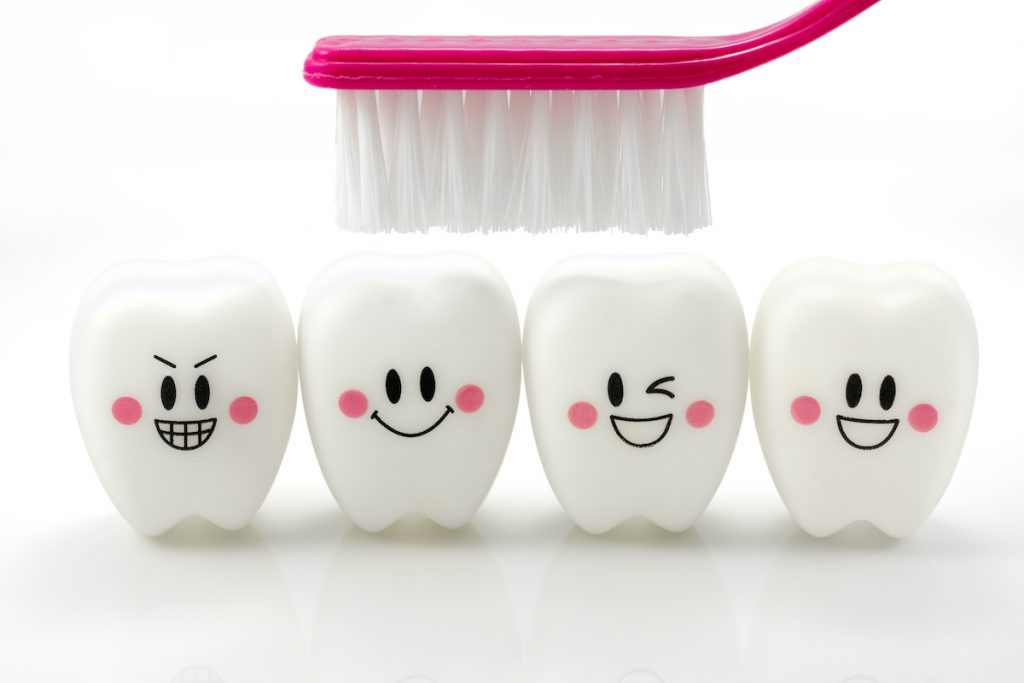People with severe mental illness more likely to have poor dental health

Poor oral health has a profound effect on general health and quality of life and can have an impact on social life, self-esteem, and social interactions by affecting eating, speech, and other social and psychological areas of life (Sischo & Broder, 2011).
People with mental health difficulties tend to have increased rates of comorbid physical illness. For example, the burden of oral disease is high in people diagnosed with severe mental illness (SMI). The evidence indicates that they are nearly three times more likely of losing all their teeth compared to people without SMI (Kisely et al., 2015). This is often attributed to risk factors including difficulties with self-care and lifestyle factors (for example brushing teeth, consumption of dietary sugar, and smoking) (Turner et al., 2021, Teasdale et al., 2019). Moreover, people with mental health difficulties are less likely to use dental services in comparison to non-clinical controls, due to several barriers related to their mental illness and lack of social support to get access to dental care (Turner et al., 2021).
Poor oral health has a profound effect on people’s general health and quality of life (Patel & Gamboa, 2012), as well as linkage to chronic conditions such as diabetes, cardiovascular disease and cancer (Xu et al., 2017; Teeuw et al., 2010; Kisely et al., 2018). However, it remains a largely neglected issue, especially for this vulnerable population. Less focus has been placed on oral health among people with SMI in research and practice, therefore available data on their dental diseases is limited.
In this umbrella review, Choi et al. (2022) aim to explore the association between mental illness and oral health.

People with severe mental health difficulties are more likely to experience comorbid oral health diseases.
Methods
The authors searched related important databases, including PubMed, MEDLINE, PsycINFO, the Cochrane Central Register of Controlled Trials, Embase and CINAHL to identify meta-analyses relevant to their inclusion criteria. The authors registered a protocol for this umbrella review on PROSPERO.
The authors included studies exploring the association of mental illness and oral health, which included different mental illnesses and substance use clinically and/or through diagnosis. They excluded papers with a primary focus on dental phobia and neurodegenerative diseases such as dementia, learning disability, and alcohol and tobacco use. Dental caries, periodontal disease, erosion, and partial or total tooth loss (edentulism) were considered as the outcomes. The outcomes were measured with standardised measures where possible.
The identified papers were assessed independently. The quality of the studies was assessed in line with the National Institutes of Health (NIH) Quality Assessment of Systematic Reviews and Meta-Analyses.
Results
The authors identified 1038 references through an initial search. Following 319 duplicates removal and title–abstract screening, 58 records were included for full-text screening, and finally, 11 meta-analyses were included in their umbrella review.
The study population of the included papers included people with SMI, common mental disorders (depression, depression and anxiety), eating disorders, bulimia and related conditions, and drug or different substance user. One meta-analysis solely reported fixed effects models where as other meta-analyses reported random effects models.
In terms of quality and credibility of evidence as per the NIH scale, the meta-analyses ranged from fair to good quality with some concerns about the effect of confounding factors as the NIH scale does not take into account whether the meta-analyses used adjusted or raw data. The authors mentioned some concerns about measuring symptoms to make psychiatric diagnoses and using highly variable diagnostic criteria and cut-off values for periodontal disease. Lack of dental assessor training and blinding to psychiatric status was common for most of the outcomes. The level of evidence was strongest for dental decay and edentulism in SMI and weak to suggestive or not significant for other psychiatric disorders and dental outcomes.
The authors reported the results by dental outcomes. Seven included meta-analyses that reported caries and periodontitis. Three meta-analyses were on edentulism and on erosion. The association between dental decay and severe mental illness or substance use was the strongest. People with schizophrenia had, on average, eight more decayed, missing, and filled teeth (DMFT) compared to people without SMI. The authors pointed out that more decayed (DT) and missing teeth (MT), but less filled teeth (FT) in people with SMI and substance users indicated barriers in accessing dental care for necessary dental treatment. Depression, anxiety, and eating disorders were also generally associated with caries, but the datasets were small. Associations were also found with erosion and eating disorders. Findings for periodontal disease were unclear, due to study heterogeneity.
One striking finding was that people with SMI were also three times more likely to be edentulous or lost all their teeth than people without SMI (odds ratio=2.81, 95% confidence interval (CI) between 1.73 and 4.57) and those with depression, the odds ratios were between 1.17 and 1.32.

Untreated dental caries and periodontitis lead to higher rates of loss of natural teeth in people with SMI.
Conclusions
The burden of dental diseases is significantly higher in people with psychiatric and substance-use disorders, and particularly those with SMI compared to the general population.

Disparities in poor oral health in people with SMI, and other psychiatric and substance-use disorders should receive more attention.
Strengths and limitations
The main strength of this umbrella review is that the authors comprehensively assessed the four main dental outcomes across a range of psychiatric and substance-use disorders following the recommendations of several sources for conducting an umbrella review. This was an important contribution to identifying the gaps in this specific research field and to informing recommendations for further research.
The authors acknowledged several limitations to their umbrella review including wide variations in both the included meta-analyses and contributing studies in different aspects. Many of the results had high heterogeneity and the assessment of publication bias was limited.
An umbrella review is informative when multiple systematic reviews and meta-analyses (SRMAs) have already been published on a specific research topic (Belbasis et al. 2022).
However, only a trivial number of relevant SRMAs were available for some of the associations assessed in this umbrella review. Also, only a small number of studies were included in some meta-analyses, which obviously limits the precision of the results (Borenstein, 2009).
Several of the included meta-analyses were authored by authors of this umbrella review. Therefore, to reduce the risk of bias, study selection, and quality appraisal were undertaken by three of the other authors.
Finally, core outcome sets (COS) (Kirkham et al. 2016) are still not available for routine measurement in dental research. These could enhance the relevance of research by ensuring that the outcomes measured are important to dental service users and related stakeholders. Some clinically relevant outcomes like ‘oral health-related quality of life’ were not reported in any of these included studies (Pannut et al. 2020).

The umbrella review assessed the main dental outcomes across a range of psychiatric and substance use disorders.
Implications for practice
As dental diseases are highly preventable, prevention should be a priority, including the promotion of dental care.
The authors recommended closer collaboration between dental and mental health professionals and mentioned further clinical implications:
mental health clinicians should screen for oral diseases when treating those with mental illness using standard checklists that can be completed by non-dental personnel, as well as facilitate referral to affordable dental clinics when indicated. People should also be advised on the management of xerostomia when prescribed psychotropic drugs.
Though disparities in poor health in people with SMI should get attention, currently there is comparatively less research on how to improve their oral health and reduce these oral health inequalities. A systematic review gathered evidence on the effectiveness of interventions, which were tested to improve oral health for this group (Macnamara et al. 2021). The review highlighted that most of these interventions focused on individual-level behaviour change and there is not enough evidence to demonstrate the effectiveness of these interventions. In this umbrella review the recommendation was for system-level intervention by effective integration of mental and dental health care services to provide better support for people with SMI in their oral health care needs (Choi et al, 2022).
The authors indicated barriers to accessing dental treatment despite of huge need for people with SMI and substance users in their analysis. An exploratory study also identifies several barriers to oral health care and service use in people with SMI, from the perspectives of both service users and service providers (please see related YouTube videos – links below). The main barriers identified were the impact of mental ill-health, lack of patient involvement or a tailored approach, issues related to accessibility and availability of dental services, and lack of integration of services. The main facilitators identified were service providers’ effective communication skills, involvement of carers, and provision of comprehensive care (Mishu et al., 2022a). The provision of dental care under the same roof as mental health care was described by the people with SMI as the best possible care that could be offered. Multiple visits to different institutions were mentioned as difficult and stressful. Effective integration of dental health care and mental health care would be beneficial (Mishu et al., 2022b).
Finally, we need to stop thinking about oral health as separate from the rest of a person’s health. Following a comprehensive approach by bringing together mental health service providers, dental health professionals and researchers, and people with lived experience, a consensus statement was developed (The Right To Smile consensus) that recommended the 5 year action plan to improve oral health in people with SMI and suggested more collaborative ‘whole-person care’ approaches by involving different stakeholders.

Effective integration between mental and dental health care services is recommended to improve oral health in this vulnerable group.
Closing the Gap Network Resources
Statements of interest
Masuma has published peer-reviewed research in oral health and severe mental health illness but has no involvement or conflicts of interest with the paper reviewed in this blog.
Links
Primary paper
Choi J, Price J, Ryder S, Siskind D, Solmi M, Kisely S. (2022) Prevalence of dental disorders among people with mental illness: An umbrella review. Australian & New Zealand Journal of Psychiatry. 2022;56(8):949-963. doi:10.1177/00048674211042239
Other references
Sischo, L.; Broder, H. Oral health-related quality of life: What, why, how, and future implications. J. Dent. Res. 2011, 90, 1264–1270
Kisely S, Baghaie H, Lalloo R, Siskind D, Johnson NW. A systematic review and meta-analysis of the association between poor oral health and severe mental illness. Psychosom Med. 2015, 77(1):83-92. doi: 10.1097/PSY.0000000000000135. PMID: 25526527.
Turner E, Berry K, Aggarwal VR, Quinlivan L, Villanueva T, Palmier-Claus J. Oral health self-care behaviours in serious mental illness: A systematic review and meta-analysis. Acta Psychiatr Scand. 2022, 145(1):29-41. doi: 10.1111/acps.13308.
Teasdale, S., Ward, P., Samaras, K., Firth, J., Stubbs, B., Tripodi, E., & Burrows, T. Dietary intake of people with severe mental illness: Systematic review and meta-analysis. The British Journal of Psychiatry. 2019, 214(5), 251-259. doi:10.1192/bjp.2019.20
Patel, R.; Gamboa, A. Prevalence of oral diseases and oral-health-related quality of life in people with severe mental illness undertaking community-based psychiatric care. Br. Dent. J. 2012, 213, E16]
Teeuw, W.J.; Gerdes, V.E.; Loos, B.G. Effect of periodontal treatment on glycemic control of diabetic patients: A systematic review and meta-analysis. Diabetes Care. 2010, 33, 421–427
Xu, S.; Song, M.; Xiong, Y.; Liu, X.; He, Y.; Qin, Z. The association between periodontal disease and the risk of myocardial infarction: A pooled analysis of observational studies. BMC Cardiovasc. Disord. 2017, 17, 50
Kisely S, Lalloo R and Ford P Oral disease contributes to illness burden and disparities. Medical Journal of Australia. 2018, 208(4): 155–156.
Belbasis L, Bellou V, Ioannidis JPA. Conducting umbrella reviews BMJ Medicine 2022;1:e000071. doi: 10.1136/bmjmed-2021-000071
Borenstein, M. 2009. Introduction to Meta-analysis. Chichester: Wiley.
Pannut CM, Sendyk DI, Gracas YT et. al. Clinically relevant outcomes in dental clinical trials: challenges and proposals. CritiCal review Dentistry. 2020.
Kirkham JJ, Gorst S, Altman DG, Blazeby JM, Clarke M, Devane D, et al. Core Outcome Set–STAndards for Reporting: The COS-STAR Statement. PLoS Med.2016, 13(10): e1002148.
Macnamara A, Mishu MP, Faisal MR, Islam M& Peckham E. Improving oral health in people with severe mental illness (SMI): A systematic review. PLOS ONE. 2021, 16, 12, p. e0260766
Mishu MP, Faisal MR, Macnamara A, Sabbah W, Peckham E, Newbronner L, Gilbody S, Gega L. A Qualitative Study Exploring the Barriers and Facilitators for Maintaining Oral Health and Using Dental Service in People with Severe Mental Illness: Perspectives from Service Users and Service Providers. International Journal of Environmental Research and Public Health. 2022a, 19(7):4344.
Mishu MP, Faisal MR, Macnamara A, Sabbah W, Peckham E, Newbronner L, Gilbody S and Gega L Exploring the contextual factors, behaviour change techniques, barriers and facilitators of interventions to improve oral health in people with severe mental illness: A qualitative study. Front. Psychiatry. 2022b, 13:971328. doi: 10.3389/fpsyt.2022.971328
Source link
#People #severe #mental #illness #poor #dental #health

